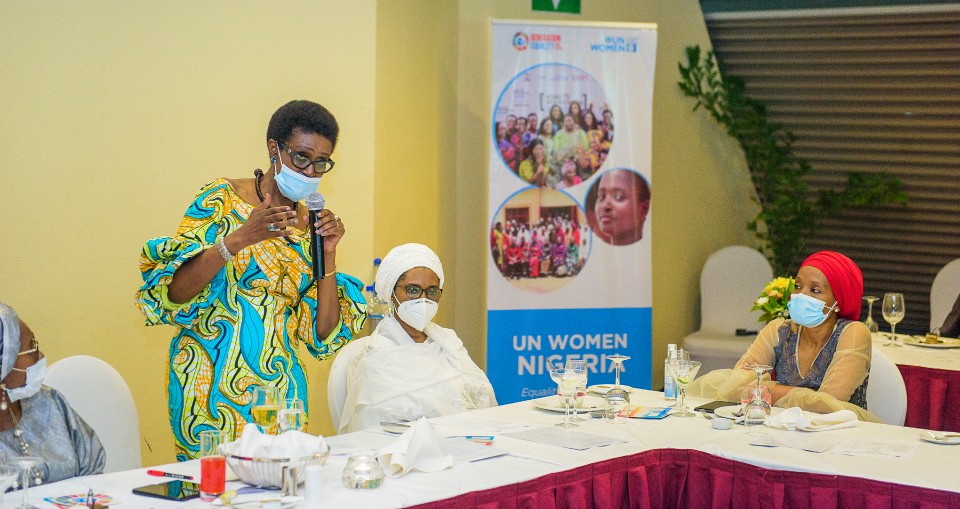UN Women and UNAIDS partner to advocate for inclusive governance and women’s rights in Nigeria
During Women’s History Month, to address gender equality and to implement policies that will allow more women to participate in leadership and governance, UN Women and UNAIDS met to shape the conversation. The Executive Director of UNAIDS, Ms. Winnie Byanyima, who was visiting Nigeria, held an interactive session with women leaders and government officials to drum up support for women. She also assessed the efforts and strategies deployed in the fight against COVID-19 and HIV/AIDS in Nigeria.Date:
While addressing women in Abuja, Ms. Byanyima lamented the lopsided societal expectations placed on girls and women, which more often than not result in truncating a bright future. She emphasized the relevance of women’s leadership and the importance of women living healthy lives that are not dictated by obnoxious traditions and religious practices.

In setting the tone for the conversation, UN Women Country Representative to Nigeria and ECOWAS, Ms. Comfort Lamptey, said the meeting was convened to provide a platform for the visiting UNAIDS head to present the agency’s new five-year strategy to end the inequalities that have been fuelling HIV globally, with the goal of ending the epidemic by 2030.
“It's a strategy that is people centred and emphasizes the prevention of HIV. Nigeria has the fourth-largest HIV epidemic globally, and as with the COVID-19 pandemic, HIV bears a woman's face here in Nigeria, as the prevalence is more than double for women. Data shows that, of the 1.8 million estimated people living with HIV in Nigeria, the prevalence rate for women is 1.7 per cent, compared to 0.8 per cent for men; particularly for the category of women aged 20 to 24 years, the prevalence is three times that of men.”—Comfort Lamptey, UN Women Country Representative to Nigeria and ECOWAS
The challenges of sustainable legal and political frameworks for gender equality and women's empowerment in Nigeria also came to the fore during the discussions. According to the First Lady of Ekiti State, Erelu Bisi Fayemi, these are vital to ensuring that the rights of women are not arbitrarily violated. She reported that her state has been a model for tackling gender inequality and sexual violence at the policy level. The First Lady facilitated the passage of four bills – a bill on gender-based violence, the Gender and Equal Opportunities SENATE, an HIV anti-discrimination bill, as well as the Treatment, Care and Protection of Sexually Abused Minors Bill – aimed at protecting women and girls from all forms of sexual and gender-based violence. The state was also the first in Nigeria to have a Sex Offenders Register.
For her part, Pauline Tallen, Nigeria's Minister of Women Affairs, bemoaned the lack of women in decision-making spaces and linked this reality to the developmental and economic challenges facing the country. She encouraged women not to give up, but to continue to fight societal injustices against them. She observed that “most of the women in the north are highly educated, but they are denied their rights” and promised that women will no longer watch things deteriorate, but “will continue drumming and talking until things change for the better”.
Discussing practical ways to harness the creative energies of young people to transform governance in Nigeria, Kiki Mordi, an investigative journalist, stated that listening to the youth is critical to having any meaningful development in a society. She has also praised the youth for their insight and emphasized the importance of intergenerational dialogue.
“Realistically, we can't achieve much if we don't listen to the young people. They have fresh energy that is easy to lose in the fight. When you're always in the middle of chaos – in the middle of advocating for a thing that you're so passionate about – it is very easy to lose that energy.”—Kiki Mordi, investigative journalist
Speaking on improving women’s participation in politics, Oby Ezekwesili, former Vice President of the World Bank, said women must first recognize that they are not short of knowledge, but encouraged them to “to be better at collecting and crystallizing the knowledge into a necessary set of actions”. In her words, “there is no governance without politics”, and she encouraged more women to take part in active politics.
The UNAIDS Chief also met with Nigeria’s President, Muhammadu Buhari, to discuss the country’s response to the twin challenges of HIV and COVID-19. The visit sought to recognize Nigeria’s recent accomplishments in HIV management and to boost confidence among leaders and stakeholders that Nigeria can win the fight against HIV/AIDS. The visit will also help the agency garner political support for the next Global AIDS Strategy (2021–2026) and the UN General Assembly Special Session on AIDS in June 2021.